Transferts monétaires à usages multiples
Les transferts monétaires à usages multiples sont des transferts monétaires non affectés que les personnes vivant en situation de crise peuvent utiliser pour couvrir leurs besoins essentiels. Par nature, il s’agit de la modalité d’aide qui offre le plus de choix, de flexibilité et de dignité aux bénéficiaires. De plus en plus de données montrent qu’il est plus pertinent en termes d’optimisation des coûts et de rapport coût/résultat de répondre à plusieurs besoins à la fois.
Cependant, cette modalité exige aussi des acteurs humanitaires qu’ils mettent en place de nouvelles manières de collaborer, à toutes les étapes du cycle de programme, et entre secteurs. Même s’il existe des outils fiables pour faciliter la collaboration, ils ne sont pas mis en œuvre à grande échelle et le recours aux transferts monétaires à usages multiples est encore ponctuel. Il reste à relever plusieurs défis si nous souhaitons intégrer efficacement les transferts monétaires à usages multiples au système humanitaire.
Contenu associé
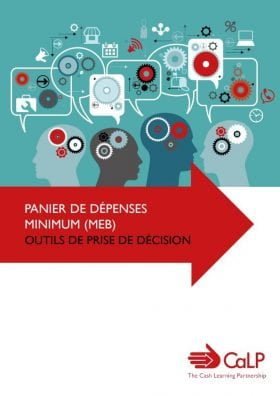
Panier de dépenses minimum (MEB) – Outil de prise de décision
Guides et outils
Cet outil de prise de décision est fait pour accompagner les praticiens et les décideurs à travers les étapes clés du processus de calcul du MEB. Elle décrit les différentes étapes et approches possibles du processus d’élaboration du MEB, et donne des liens vers de nombreuses ressources complémentaires.

Orientations opérationnelles et boîte à outils pour les transferts monétaires à usages multiples
Guides et outils
Les présentes orientations opérationnelles et la boîte à outils qui l’accompagne réunissent une expertise mondiale sur les interventions monétaires. Elles apportent aux acteurs humanitaires des orientations complètes et pratiques afin d’évaluer la faisabilité des transferts monétaires, d’en déterminer la conception et d’en structurer la mise en oeuvre. Les...

Définition des Paniers de Dépenses Minimum (MEB) en Afrique de L’Ouest
Rapport
Au cours de l’année 2017, 5 pays d’Afrique de l’Ouest ont lancé un travail collectif de définition du panier de dépenses minimum, afin de mieux comprendre la contribution de l’aide humanitaire à la couverture des besoins de base des populations affectées et d’améliorer son impact. Ce processus, souvent fastidieux, a soulevé des défis techniques, mais également mis en...
Thematic lead
Latest

Market Analysis Tools in Rapid-Onset Emergencies: Phase one report
Report
This report was commissioned by Oxfam’s Emergency Food Security and Livelihood (EFSL) team as part of a larger exercise to develop a market analysis toolkit for rapid-onset emergency situations. The impetus for this arose from the recognition by Oxfam, other humanitarian agencies and donors that the...

The Use of Cash/Vouchers in Response to Vulnerability and Food Insecurity: Case study review and analysis
Report
This document summarizes the major characteristics and outcomes of 27 recent pilots, projects or programs worldwide that made use of cash and/or vouchers to provide benefits to people in need. The concluding section attempts to synthesize the commonalities and contrasts among those cases, as a first step...
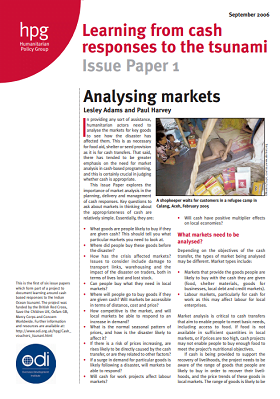
Learning from cash responses to the tsunami: Issue Paper 1: Analysing markets
Report
This is the first of six issue papers which form part of a project to document learning around cash-based responses to the Indian Ocean tsunami. The project was funded by the British Red Cross, Save the Children UK, Oxfam GB, Mercy Corps and Concern Worldwide. This 5-page Issue Paper explores the broad...
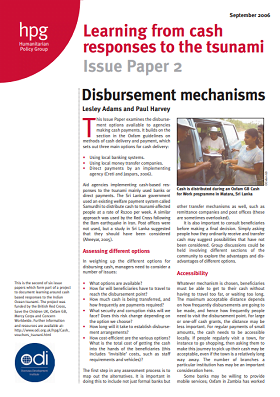
Learning from cash responses to the tsunami: Issue Paper 2: Disbursement mechanisms
Report
This is the second of six issue papers which form part of a project to document learning around cash-based responses to the Indian Ocean tsunami. The project was funded by the British Red Cross, Save the Children UK, Oxfam GB, Mercy Corps and Concern Worldwide. This 5-page Issue Paper examines the...
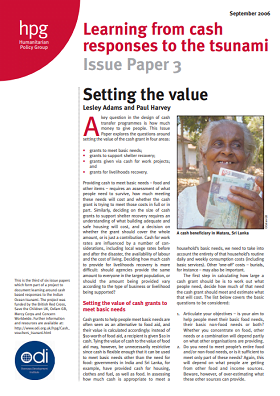
Learning from cash responses to the tsunami: Issue paper 3: Setting the value
Report
This is the third of six issue papers which form part of a project to document learning around cash-based responses to the Indian Ocean tsunami. The project was funded by the British Red Cross, Save the Children UK, Oxfam GB, Mercy Corps and Concern Worldwide. A key question in the design of cash transfer...

Learning from cash responses to the tsunami: Issue Paper 4: Cash and shelter
Report
This is the fourth of six issue papers which form part of a project to document learning around cash-based responses to the Indian Ocean tsunami. The project was funded by the British Red Cross, Save the Children UK, Oxfam GB, Mercy Corps and Concern Worldwide. This Issue Paper highlights some of the key...
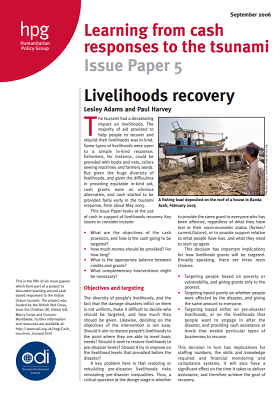
Learning from cash responses to the tsunami: Issue Paper 5: Livelihoods recovery
Report
This is the fifth of six issue papers which form part of a project to document learning around cash-based responses to the Indian Ocean tsunami. The project was funded by the British Red Cross, Save the Children UK, Oxfam GB, Mercy Corps and Concern Worldwide. This Issue Paper looks at the use of cash in...

Independent Evaluation of Oxfam GB Malawi’s Emergency Cash – Transfer Programme
Case Study
Poor rainfall in Malawi in the 2004/2005 growing season resulted in significantly reduced cereal and non-cereal food production in the country, leaving up to 4 million people in need of assistance. In response, Oxfam planned a programme in southern Malawi, which included a ‘pilot’ cash-transfer...

Hurricanes Katrina and Rita Disaster Relief
Report
Hurricanes Katrina and Rita destroyed homes and displaced millions of individuals. In the wake of these natural disasters, the Federal Emergency Management Agency (FEMA) responded to the need to provide aid quickly through the Individuals and Households Program (IHP), which provides housing assistance,...
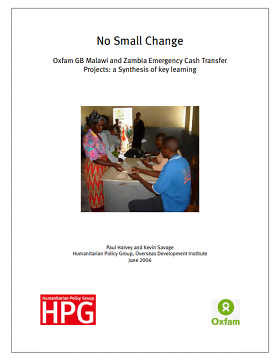
No small change: Oxfam GB Malawi and Zambia emergency cash transfer projects: A synthesis of key learning
Case Study
This learning document uses Oxfam GB’s experience of emergency cash transfer programming in Malawi and Zambia to draw out some important lessons in using cash. It examines the two programmes and the findings of the evaluations and asks the question, “Is cash more cost-effective than food aid?”...

Market-Based Food Assistance Pilot Project Pidie and Lhokseumawe Districts, Banda Aceh: Report of Final Evaluation
Report
This report represents the findings of a final evaluation undertaken for Save the Children Indonesia/Banda Aceh of its Market-based Food Assistance (MBFA) Pilot Project carried out in Pidie and Lhokseumawe districts in early 2006. For 3 months, from February-April 2006, SC/BA implemented a pilot project,...
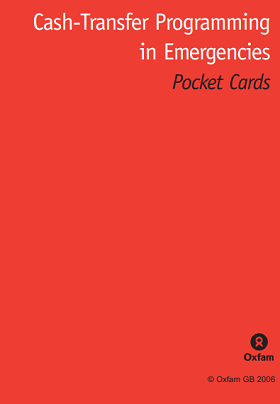
Cash-transfer programming in emergencies – Pocket cards
Report
In emergencies, distributing cash can often meet people’s immediate needs more quickly and appropriately than the direct distribution of commodities. Cash gives people choices and thereby preserves their dignity. These 15 cards contain key elements from the book, which draws on Oxfam’s experience to...

Transferts d’argent: Programmation pour les situations d’urgences
Guides et outils
Un guide compact et concis visant à soutenir les gestionnaires de programmes afin d’évaluer si le cash est la réponse la plus appropriée en cas d’urgence et de choisir entre différents types d’interventions monétaires. Ce guide est basé sur l’expérience d’Oxfam GB sur cinq ans...

Mapping the Risks of Corruption in Humanitarian Action
Report
The issue of corruption in emergency relief and rehabilitation is a key concern for practitioners, who invest considerable resources and energy in trying to minimise it. However, it has barely been discussed in policy terms, and little researched. This paper aims to map the risks of corruption in the...

Cash Grants and Microfinance in Livelihood Recovery: Experiences from tsunami-affected areas of Sri Lanka
Report
The devastating tsunami that hit Sri Lanka on 26 December 2004 killed over 35,000 people, making it the worst natural disaster in the country’s recorded history. Over 200,000 people were estimated to have lost their livelihoods, half of them in the fishing sector. The major objectives of the study is...

Voucher Distributions
Report
This document is largely based on the experience gained by GOAL’s team in its response to the 2005 earthquake in Pakistan and aims to discuss:
1. Options for transferring resource to a community in an emergency situation.
2. The appropriateness of the different methods of resource transfer to different
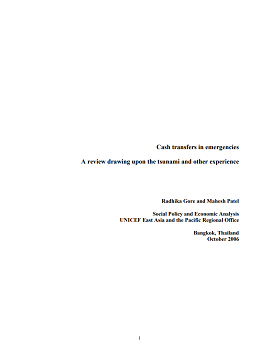
Cash Transfers in Emergencies: A Review Drawing upon the Tsunami and Other Experience
Report
This 2006 document from the Social Policy and Economic Analysis office of UNICEF (East Asia and the Pacific Region) draws upon examples from the tsunami and other contexts to explore cash transfer experience in emergencies. It presents existing evidence of impact of cash transfers on children; reasons...
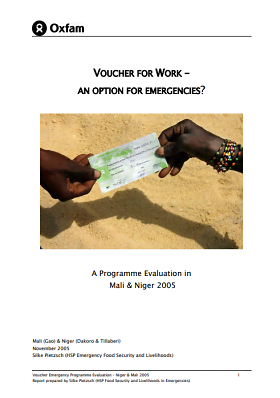
Voucher for work: An option for emergencies?
Report
This Oxfam GB evaluation report gathers successes, constraints and lessons learned during the implementation of two voucher programmes in Mali and Niger, following the food crisis in 2005. It begins by examining the appropriateness of the programme decision-making, and then looks at the two programme...

Mapping the Market: A framework for rural enterprise development policy and practice
Guidelines and Tools
Markets matter to the rural poor. It is increasingly clear that in tackling rural poverty, market-related issues – including access to information, institutions, linkages and trade rules – are vital considerations. Failure to address these issues means that the benefits of other developments...
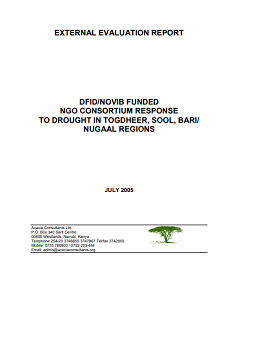
DFID/NOVIB Funded NGO Consortium Response to Drought in Togdheer, Sool, Bari/ Nugaal Regions
Case Study
This is a summary of the June 2005 evaluation of the NGO Consortium response to drought in Togdheeer, Sool, Sanaag and Bari/ Nugaal in Somaliland. The consortium response to drought was meant to provide cash to targeted drought-affected households to help them meet their basic needs. Important among the...




